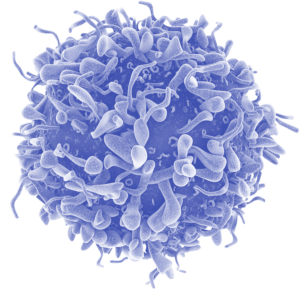Infertility
Infertility happens when a couple cannot conceive after having regular unprotected sex.The cause of infertility may be difficult to determine but may include inadequate levels of certain hormones in both men and women, and trouble with ovulation in women.
There are two types of infertility, primary and secondary.
Primary infertility : It refers to couples who have not become pregnant after at least 1 year having sex without using birth control methods.
Secondary infertility: It refers to couples who have been able to get pregnant at least once, but now are unable.
Many physical and emotional factors can cause infertility. It may be due to problems in the woman, man, or both.
FEMALE INFERTILITY
Female infertility may occur when:
- A fertilized egg or embryo does not survive once it attaches to the lining of the womb (uterus).
- The fertilized egg does not attach to the lining of the uterus.
- The eggs cannot move from the ovaries to the womb.
- The ovaries have problems producing eggs.
- Female infertility may be caused by:
- Autoimmune disorders, such as antiphospholipid syndrome (APS)
- Birth defects that affect the reproductive tract
- Cancer or tumor
- Clotting disorders
- Diabetes
- Drinking too much alcohol
- Exercising too much
- Eating disorders or poor nutrition
- Growths (such as fibroids or polyps) in the uterus and cervix.
- Medicines such as chemotherapy drugs
- Hormone imbalances
- Obesity
- Older age
- Ovarian cysts and polycystic ovary syndrome (PCOS)
- Pelvic infection resulting in scarring or swelling of fallopian tubes (hydrosalpinx) or pelvic inflammatory disease (PID)
Scarring from sexually transmitted infection, abdominal surgery or endometriosis - Smoking
- Surgery to prevent pregnancy (tubal ligation) or failure of tubal ligation reversal (reanastomosis)
- Thyroid diseases
MALE INFERTILITY
Male infertility may be due to:
- Decreased number of sperm
- Blockage that prevents the sperm from being released
- Defects in the sperm
- Male infertility can be caused by:
- Birth defects
- Cancer treatments, including chemotherapy and radiation
- Exposure to high heat for prolonged periods
- Heavy use of alcohol, marijuana, or cocaine
- Hormone imbalance
- Impotence
- Infection
- Medicines such as cimetidine, spironolactone, and nitrofurantoin
- Obesity
- Older age
- Retrograde ejaculation
- Smoking
- Toxins in the environment
- Vasectomy or failure of vasectomy reversal
Healthy couples under age 30 who have sex regularly will have a 25% to 30% per month chance of getting pregnant each month.
Natural cycle monitoring, counselling about fertile period
2. Ovulation induction with tablets and follicular monitoring
3. Superovulation with injectables (Gonadotrophins), follicular monitoring and luteal support.
4. SPERM Quality and Quantity are improved by traditional ways, tablets, hormonalinjections.
5. Erection and ejaculation or semen collection issues are addressed
6. Intra Uterine Insemination (IUI)
7. Myomectomy, septal resection, vaginoplasty
8. Endometriotic cystectomy
9. Tubal recanalization
10. In Vitro Fertilization (IVF)
11. Green IVF or minimal stimulation protocol
12. Intra Cytoplasmic Sperm Injection (ICSI)
13. MESA, TESA, TESE
14. Donor Oocyte program
15. Surrogacy
16. Donor Embryo Program
Intrauterine insemination (IUI) :
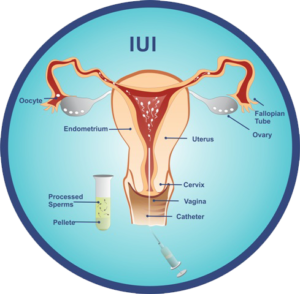
At the time of ovulation, a fine catheter is inserted through the cervix into the uterus to place a sperm sample directly into the uterus. The sperm is washed in a fluid and the best specimens are selected.
IUI is more commonly done when the man has a low sperm count, decreased sperm motility, or when infertility does not have an identifiable cause. It can also help if a man has severe erectile dysfunction.
In-vitro fertilization (IVF) :
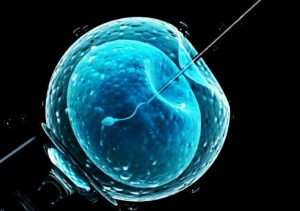
Sperm are placed with unfertilized eggs in a petri dish, where fertilization can take place. The embryo is then placed in the uterus to begin a pregnancy. Sometimes the embryo is frozen for future use.
IVF Process :
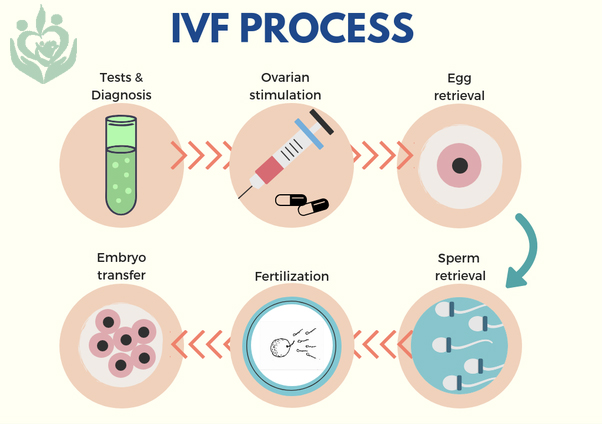
Intracytoplasmic sperm injection (ICSI) :
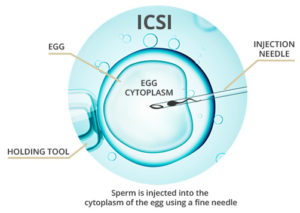
A single sperm is injected into an egg to achieve fertilization during an IVF procedure. The likelihood of fertilization improves significantly for men with low sperm concentrations.
Embryo Development:
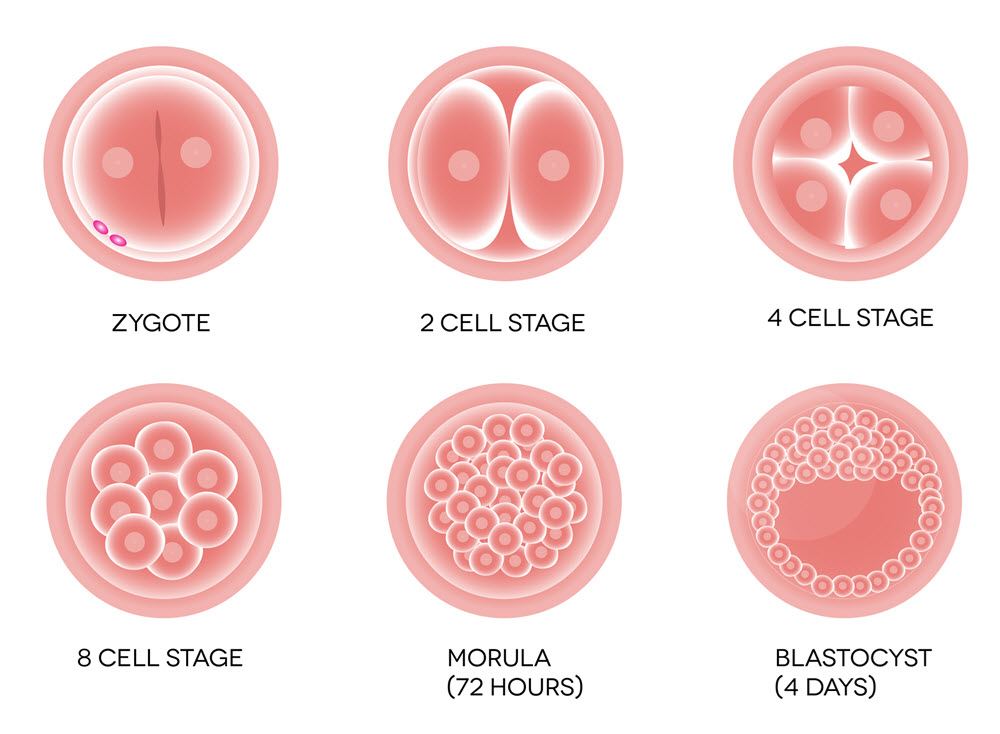
ICSI Procss :
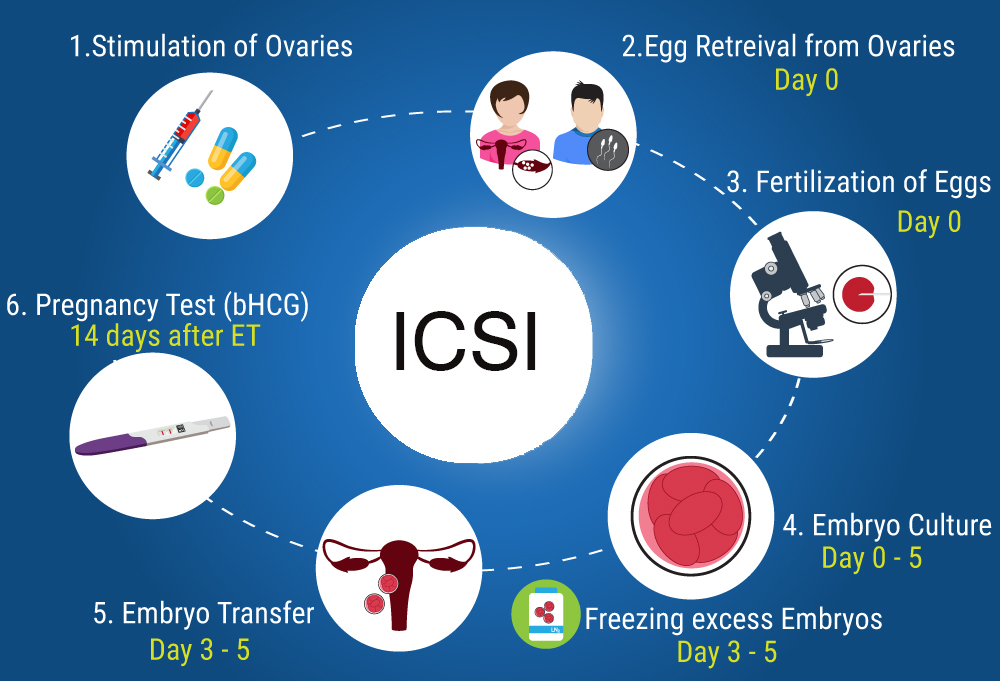
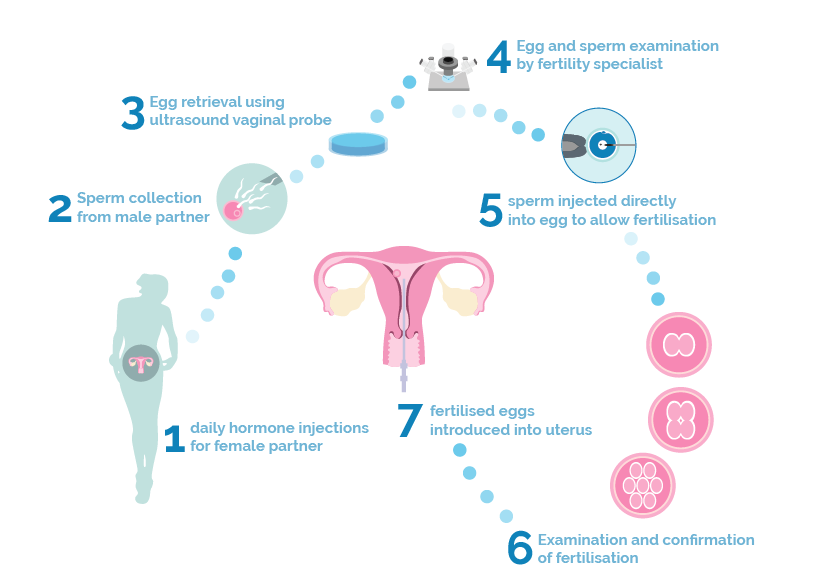
Sperm or egg donation:
Sperm or eggs can be received from a donor. Fertility treatment with donor eggs is usually done using IVF.
Surgical sperm aspiration:
The sperm is removed from part of the male reproductive tract, such as the vas deferens, testicle, or epididymis.
Gynecology
Gynecology deals with any ailment concerning the reproductive organs; uterus, fallopian tubes, cervix, ovaries and vagina.
A gynecologist may also treat related problems in the bowel, bladder and urinary system since these are closely related to female reproductive organs.
A gynecologist also treats prolapse of the pelvic organs. This is a condition usually present in postmenopausal women with weakened pelvic muscles that cannot support the uterus or bladder properly.
Women face the range of health issues that require special care – Problems like,
- DUB – Dysfunctional Uterine Bleeding
- Chronic pelvic pain
- Fibroid
- Adenomyosis
- Menstrual pain
- Cervical cancer Vaccination
- Atrophic vaginitis
- Prolapse uterus
- Endometriosis
- Pap Smear
- Irregular mensus
- Ovarian cysts
- Pelvic inflammatory disease
- Prolapse
- Vaginal Hysterectomy
- PMS
- PCOS
- Abdominal Hysterectomy
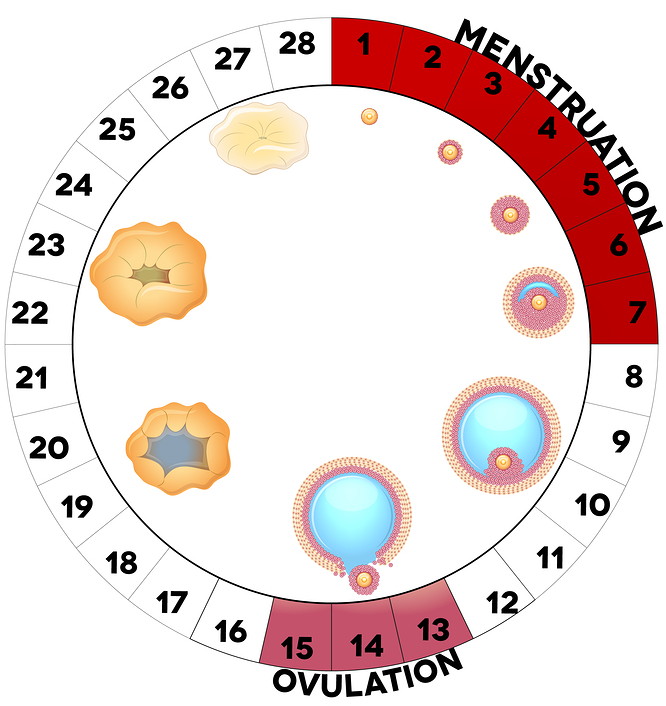
Dermatology
dermatologist is specialist doctor that manages diseases, in the widest sense, and some cosmetic problems of the skin, hair and nails.
The skin is the largest organ in the body. It is the first line of defense against bacteria and injury, and often reflects overall health.
There are several best dermatologists in Chennai for skin to take care of various types skin disorders and cosmetic issues, but we offer the best with respect to individualized care. Each skin is of different type and sensitivity, so a common medication cannot be used for same problem in two different patients.
Our doctors know the intersection between cosmetics and dermatological care. We promote skin remedies for long time by external applications, along with dietary, lifestyle modifications. This helps with long term cure, rather than short term remedies.
Our doctors are having expertise in treating various skin problems with latest and best methods possible. We have good number of patients with ultimate satisfaction with respect to cosmetic treatments. In today’s world, fresh look is needed for all ages, this is guaranteed to all. We have good cure for acne , scars, patches and for weight reduction.
- Acne
- Cold sore
- Candidiasis
- Blister
- Hives
- Scar treatment
- Laser resurfacing
- Eczema
- Psoriasis
- Tattoo Treatment
- Rosacea
- Ichthyosis
- Vitiligo
- Seborrheic dermatitis
Pediatric
Pediatricians are doctors who manage the health of your child, including physical, behavior, and mental health issues. They’re trained to diagnose and treat childhood illnesses, from minor health problems to serious diseases.
here are different type of pediatric specialists are there,
Neonatologist: Trained to handle complicated and high-risk health situations in delicate newborns and infants, including a baby who has a health issue while in the womb or is born early or with a birth defect.
Pediatric allergist: Helps prevent allergic reactions from mold to bees to food and more, which could result in asthma, a rash, or dangerous anaphylaxis.
Pediatric cardiologist: Diagnoses and treats heart conditions in children, including congenital heart disease and abnormal heart rhythms.
Pediatric endocrinologist: Treats anything related to hormones, such as diabetes or an issue around proper growth.
Pediatric gastroenterologist: For issues with digestion or gut health, such as nutritional problems, belly pain, acid reflux, and irritable bowel syndrome.
Child neurologist: Deals with brain and nervous system issues, including seizures, brain tumors, and migraines.
Pediatric oncologist: Works with children who are diagnosed with cancer.
Pediatric emergency doctor: Found in emergency rooms, managing the care of children and teenagers who are very sick or badly injured.
- Well-child exams
- School, sports and camp physicals
- Immunizations (shots)
- Treatment for minor illnesses and injuries
- X-rays & lab services
- Behavioral health consultations (for anxiety, sleep problems, ADHD, toilet training issues, and more)
- Patient education and referrals
- Annual Physicals
- Well-Baby Checkups
- Annual Physicals
- Well-Baby Checkups
- Asthma Management
- Immunizations/Vaccines
- Diabetes
- Fever , cold and common medical problems
- Hearing and Vision Checking
- Nutrition and Weight Management
- Eating Disorders (Anorexia, Bulimia, Obesity)
- Sports Medicine
- Infectious diseases
- Allergies
Surgery
We have advanced setup for laproscopy, HD cameras, surgical grade monitors, valley lab diathermy .These facilities helps our experienced surgeons to operate with ease and accuracy.
For us every patient is a VIP. We take care of every surgical procedures in the most stringent way. Sterility is maintained in all areas and by all staffs. We do microbial culture and maintain the reports regularly.We have installed Laminar Air flow system in our theatres to get pure air, free of infections.
Different types of surgeries can be performed utilizing the laparoscope.
Laparoscopic tubal ligation (Lap Sterilization)
- Lap assisted vaginal Hysterectomy (LAVH)
- Total Lap Hysterectomy (TLH)
- Myomectomy
- Hysteroscopy
- Laparoscopic Ovarian Cystectomy
- Ectopic Pregnancy
- Diagnostic Lap
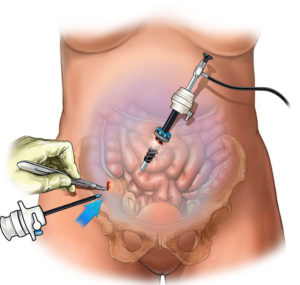
Obstetrics
An obstetrician is a doctor who specializes in pregnancy, childbirth, and a woman’s reproductive system. Although other doctors can deliver babies, many women see an obstetrician, also called an OB/GYN.
Normal Delivery
· Obstetrical care
· Pre-Pregnancy counselling
· Pregnancy testing and counselling
· Pre-natal care
· Post-partum care
· Antenatal Care
· Painless labour
· Antenatal Exercises
· Antenatal diet Councelling
· Vaginal birth after Caesarean (VABC)
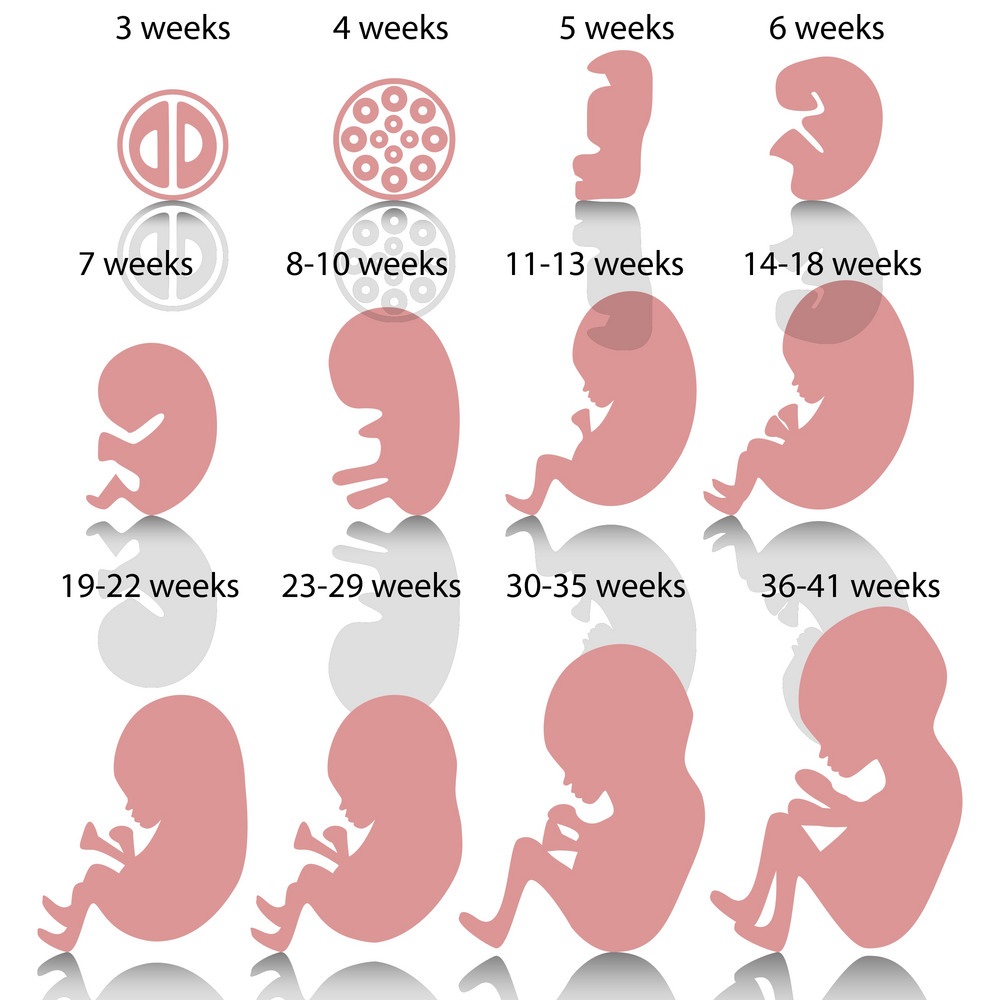
Diabetology
Diabetes is really an ailment where the system is unable to properly utilize as well as retailer crabs and glucose (a type of sugar). Sugar backs up within the body – creating one’s blood sugar (sometimes often called our blood sugar) to too much.
People with diabetes have expertise specific symptoms are,
- Becoming extremely we become parched
- Recurrent urination
- Fat reduction
- Enhanced cravings for food
- Blurry imaginative and prescient vision
- Becoming easily irritated
- Tingling as well as numbness within the palms as well as feet
- Recurrent epidermis, bladder as well as nicotine gum infections
- Wounds which do not cure
- Excessive inexplicable low energy
Random blood sugar test:
Blood sugar values are expressed in milligrams per deciliter (mg/dL) or millimoles per liter (mmol/L). Regardless of when you last ate, a blood sample showing that your blood sugar level is 200 mg/dL (11.1 mmol/L) or higher suggests diabetes, especially if you also have signs and symptoms of diabetes, such as frequent urination and extreme thirst.
Fasting blood sugar test:
A blood sample is taken after an overnight fast. A reading of less than 100 mg/dL (5.6 mmol/L) is normal. A level from 100 to 125 mg/dL (5.6 to 6.9 mmol/L) is considered prediabetes.
If your fasting blood sugar is 126 mg/dL (7 mmol/L) or higher on two separate tests, you have diabetes.
Oral glucose tolerance test:
This test is less commonly used than the others, except during pregnancy. You’ll need to fast overnight and then drink a sugary liquid at the doctor’s office. Blood sugar levels are tested periodically for the next two hours.
A blood sugar level less than 140 mg/dL (7.8 mmol/L) is normal. A reading between 140 and 199 mg/dL (7.8 mmol/L and 11.0 mmol/L) indicates prediabetes. A reading of 200 mg/dL (11.1 mmol/L) or higher after two hours suggests diabetes.
- Weight loss
- Healthy eating
- Fewer calories
- Fewer refined carbohydrates, especially sweets
- Fewer foods containing saturated fats
- More vegetables and fruits
- More foods with fiber
- Regular exercise
- Possibly, diabetes medication or insulin therapy
- Blood sugar monitoring
Orthopedics
Orthopedics is a medical specialty that focuses on the diagnosis, correction, prevention, and treatment of patients with skeletal deformities – disorders of the bones, joints, muscles, ligaments, tendons, nerves and skin. These elements make up the musculoskeletal system.
Aim at the treatment of the musculoskeletal system. This includes your bones, joints, ligaments, tendons, and muscles.
Orthopedic care often involves a team approach. Your team may include a doctor, a non-doctor specialist as well as others. Non-doctor specialists are professionals such as a physical therapist.
- Orthopedic surgeons receive 5 or more extra years of training after school. They specialize in the care of disorders of the bones, muscles, tendons, and ligaments. They are trained to manage joint problems with both operative and non-operative techniques.
- Physical medicine and rehabilitation doctors have 4 or more extra years of training after medical school. They specialize in this type of care. They are also referred to as physiatrists. They do not perform surgery, although they can give joint injections.
- Sports medicine physicians are doctors with experience in sports medicine. They have a primary specialty in family practice, internal medicine, emergency medicine, pediatrics, or physical medicine and rehabilitation. Most have 1 to 2 years of additional training in sports medicine through subspecialty programs in sports medicine. Sports medicine is a special branch of orthopedics. This provides complete medical care to active people of all ages.Bone problems may include:
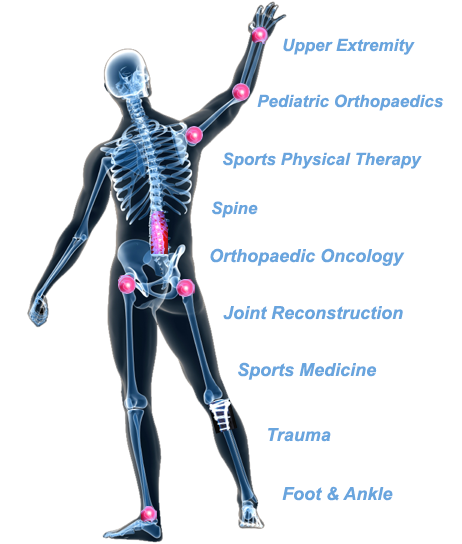
- Bone deformities
- Bone infections
- Bone tumors
- Fractures
- Need for amputation
- Nonunions: Failure of fractures to heal
- Malunions: Fractures healing in a wrong position
- Spinal deformities

ANKLE AND FOOT
- Bunions
- Fasciitis
- Foot and ankle deformities
- Fractures
- Hammer toe
- Heel pain
- Heel spurs
- Joint pain and arthritis
- Sprains
HAND AND WRIST
- Fractures
- Joint pain
- Arthritis
- Tendon or ligament injury
- Ganglion cyst
- Tendon tears
- Infection
SHOULDER
- Arthritis
- Bursitis
- Dislocation
- Frozen shoulder
- Impingement syndrome
- Loose or foreign bodies
- Rotator cuff tear
- Separation
- Torn labrum
- SLAP tears
- Fractures
KNEE
- Cartilage and meniscus injuries
- Dislocation of the kneecap (patella)
- Ligament sprains or tears (anterior cruciate, posterior cruciate, medial collateral, and lateral collateral ligament tears)
- Meniscus injuries
- Loose or foreign bodies
- Pain
- Tendinitis
- Fractures
ELBOW
- Arthritis
- Bursitis
- Dislocation or separation
- Ligament sprains or tears
- Loose or foreign bodies
- Pain
- Elbow stiffness or contractures
- Fractures
SPINE
- Herniated (slipped) disk
- Infection of the spine
- Injury to the spine
- Scoliosis
- Spinal stenosis
- Spinal tumor
- Fractures
- Spinal cord injuries
- Joint problems includes
- Arthritis
- Bursitis
- Dislocation
- Joint pain
- Joint swelling or inflammation
- Ligament tears

Oncology
Oncology is the study of cancer. An oncologist is a doctor who treats cancer and provides medical care for a person diagnosed with cancer. Oncology is the branch of medicine that researches, identifies and treats cancer.
Cancer, now, is one of the common diseases that affect people. Due to the change in lifestyle and other pollutions in our environment, cancer has become common.
The Department Of Oncology deals with cancer. Oncology department does diagnosis, various kinds of therapies, bone marrow aspiration and biopsy, the palliative care of patients and follow up of cancer patients after successful treatment.
The department is backed by a team of surgical oncologists, counselors, dieticians, histopathologists and blood bank staff, etc.
”]
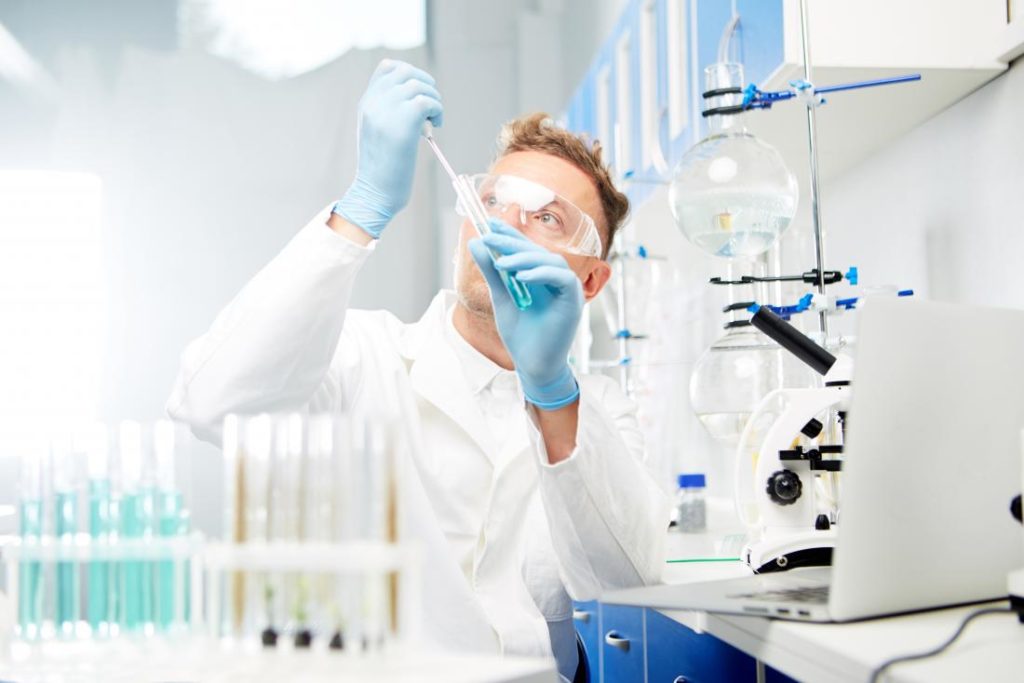
Oncologists must first diagnose cancer, which is usually carried out via biopsy, endoscopy, X-ray, CT scanning, MRI, PET scanning, ultrasound or other radiological methods.
Nuclear medicine can also be used to diagnose cancer, as can blood tests or tumor markers.
The field of oncology has three major areas: medical, surgical, and radiation.
- A medical oncologist treats cancer using chemotherapy or other medications, such as targeted therapy or immunotherapy.
- A surgical oncologist removes the tumor and nearby tissue during surgery. He or she also performs certain types of biopsies to help diagnose cancer.
- A radiation oncologist treats cancer using radiation therapy.
Other types of oncologists include:
- A gynecologic oncologist treats gynecologic cancers, such as uterine, ovarian, and cervical cancers.
- A pediatric oncologist treats cancer in children. Some types of cancer occur most often in children and teenagers. This includes certain brain tumors, leukemia, osteosarcoma, and Ewing’s sarcoma. Types of cancer more common in children sometimes also occur in adults. In these situations, an adult may decide to work with a pediatric oncologist.
- A hematologist-oncologist diagnosis and treats blood cancers, such as leukemia, lymphoma, and myeloma.
Types of Cancer
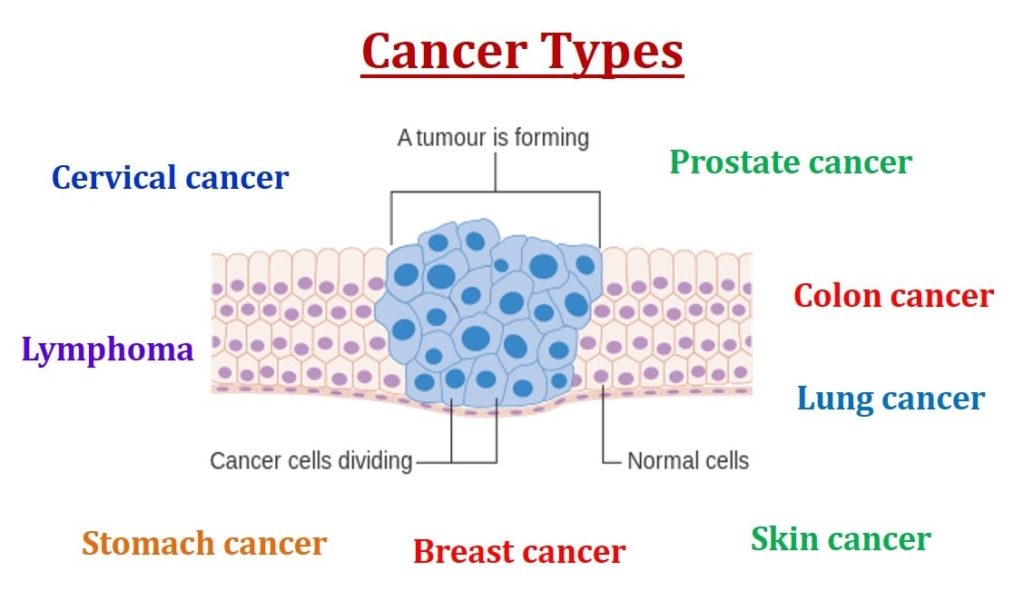
Different types of doctors often work together to create a patient’s overall treatment plan that combines different types of treatments. For instance, a patient may need treatment with a combination of surgery, chemotherapy, and radiation therapy. This is called a multidisciplinary team.
Oncology care teams also include a variety of other health care professionals:
- A pathologist reads laboratory tests. This includes checking cells, tissues, and organs to diagnose disease
- A diagnostic radiologist conducts imaging tests to diagnose disease. This includes x-rays or ultrasound tests.
- An oncology nurse
- An oncology social worker
